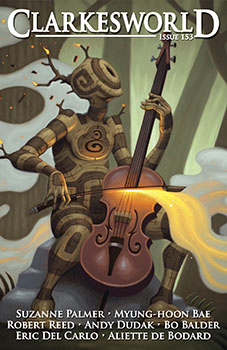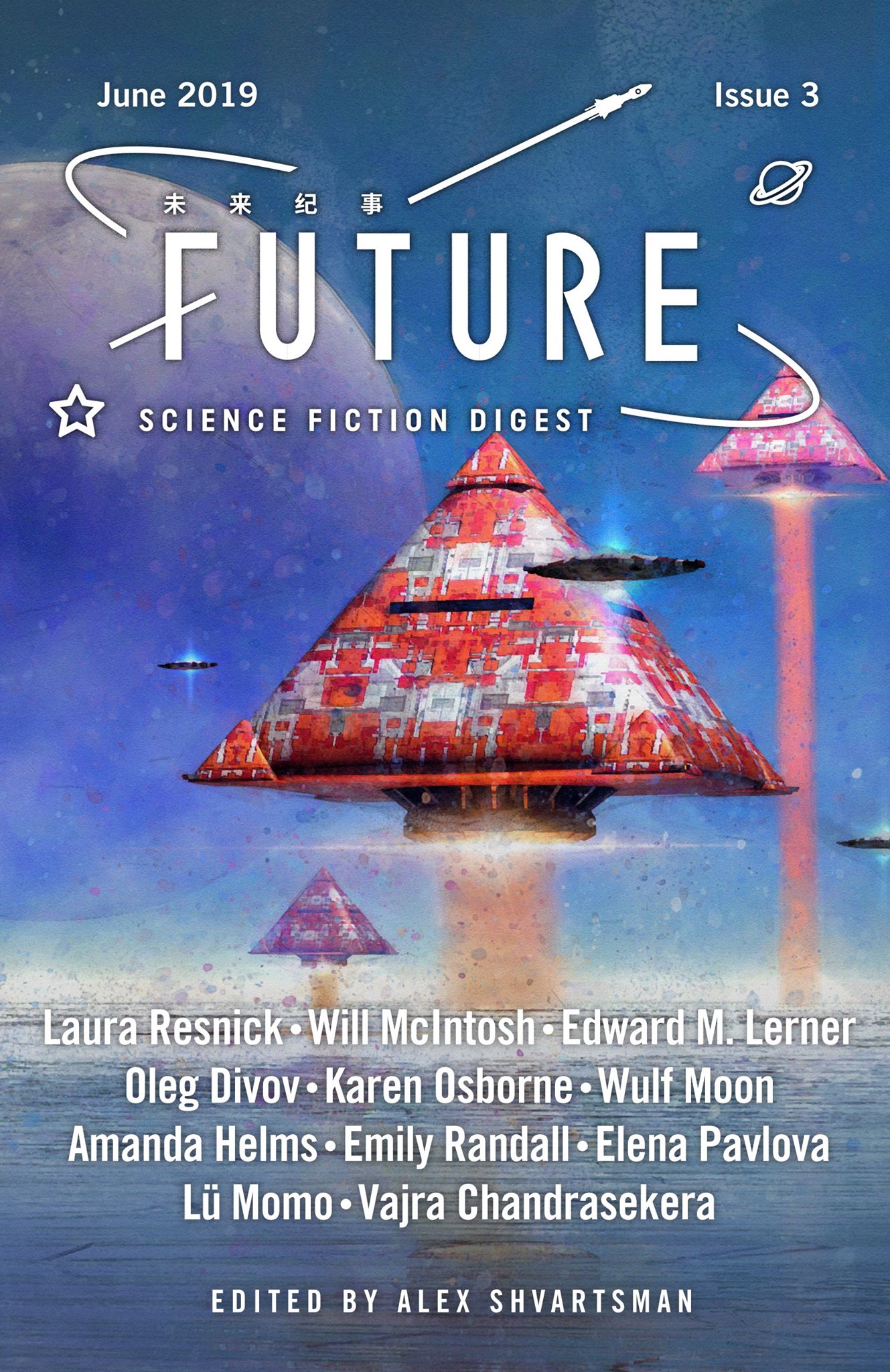Each month, Daniel Haeusser reviews short works of SFT that appear both online and in print. He is an Assistant Professor in the Biology Department at Canisius College, where he teaches microbiology and leads student research projects with bacteria and bacteriophage. He’s also an associate blogger with the American Society for Microbiology’s popular Small Things Considered. Daniel reads broadly in English and French, and his book reviews can be found at Reading1000Lives or Skiffy & Fanty. You can also connect with him on Goodreads or Twitter.
 “The Peppers of GreenScallion” by Myung-hoon Bae, translated from the Korean by Jihyun Park and Gord Sellar
“The Peppers of GreenScallion” by Myung-hoon Bae, translated from the Korean by Jihyun Park and Gord Sellar
Clarkesworld Magazine Issue 160, June 2019
The start of an off-planet conflict interferes with the friendly squabbles between a young boy and girl on the colony world GreenScallion. Though no violent conflict occurs on the planet, self-imposed political divisions and geographic restrictions appear between the two populations of settlers derived from the now warring parties. The story is an uplifting reminder of the futility and illogic of war, and the simple wisdom of children who still know how to fight with each other while staying united. The translation into English doesn’t flow smoothly in some spots, though this also arguably comes in part from the teenage protagonist’s voice. A note on co-translator Gord Sellar’s blog mentions some challenges when translating the Korean into English, “including an almost-completely untranslatable pun that meta-referentially calls out an infamous mistranslation.” The pun referred to in English appears to be ‘night-day’ and ‘knight-dame’, but the significance and story behind this is sadly unexplained in any footnote. It’s followed in the story’s dialogue with this text: “No, no, don’t explain it; that always kills a joke. Just forget it, okay?”, which ends up humorously playing up the inability to precisely translate things here. How that compares to the original remains a mystery to me.
 “Customer” by Lee Jong San, translated from the Korean by Victoria Caudle
“Customer” by Lee Jong San, translated from the Korean by Victoria Caudle
Words Without Borders, June/July 2019, The Queer Issue X
A chapter taken from ‘a futuristic novel’ the story works relatively well on its own as an excerpt, although some invented elements are not completely illuminated. The day before the entrance ceremony (presumably for a school of some sort) a Worm girl named Suni meets her androgynous roommate Ahn. Both represent something newly encountered for each, but are eager get to know one and other and learn what makes them each unique, and what they share. Traveling into the city together they go to a shop specializing in Customs – biological modifications – where Suni discovers a trait in herself she never knew was there. The translation of this flows very smoothly, even with relatively unfamiliar androgynous pronouns like ‘xe’ and ‘xyr’ for Ahn. The story is touching and positively affirming, celebrating the unique parts of individuals and shared experience of discovering those differences. Yet it still portrays the fears of being unaccepted for being different, for seeming weird. Just how that can be transcended.
“The Soldier” by Swylmar dos Santos Ferreira, translated from Portuguese by Toshiya Kamei
Teleport Magazine, June 2019
The Earth is under attack by three intelligent species from a single planet. Billions are dead and cities lie decimated, corpses strewn about. One soldier, a captain leads the remnants of a platoon against them, fighting invaders and memories of a family lot. With little space within a short story, there is unfortunately little included on the aliens, such as the reasoning for their attacks or the implications of three intelligent species evolving on one planet, yet being violent. Instead the story focuses on the weary soldier, stuck in a vicious cycle between hopeless regret or despair and stubborn survival. The soldier is on autopilot, awaiting inevitable death, but intent on taking as many invaders along with him. The story is written predominantly in short staccato sentences that mirror the repetitive tempo of the soldier’s own life.
“To the Last Drop” by Fumiki Takahashi, translated from the Japanese by Toshiya Kamei
Bewildering Stories, Issue 813, June 2019
Giant microbes (no, not the adorable plush dolls) have taken over the Earth due to continued antibiotic overuse, forcing humanity to Mars. With invented doktor nanobots in the bloodstream (and elsewhere?) to defend them, some humans return to Earth to fight back. I can certainly appreciate speculative fiction addressing very real concerns about antibiotic overuse and misuse. However, the biology here makes little sense, neither the speculative aspect nor basic details of current reality.
“From Iron and Fire” by Massimo Soumaré, translated from the Italian by Toshiya Kamei
Æther & Ichor, Issue 3: Solstice, June 2019
A short historical fantasy written from the point of view of a proud and experienced sword. Aside from one instance where the sword oddly refers to itself in the third-person as ‘the blade’, the story flows well, using flowery language suitable to high fantasy. It establishes a dark, bloodthirsty mood well, and you get the sense that while the sword has individual personality it is also a human product, forged for a purpose it cannot help but give itself fully to.
 “Americans on the Moon” by Oleg Divov, translated from the Russian by Alex Shvartsman
“Americans on the Moon” by Oleg Divov, translated from the Russian by Alex Shvartsman
Future Science Fiction Digest, Issue 3, June 2019
An alternate history set in 1980 where the US resurrected Project Horizon for construction of a military outpost on the moon as a deterrent against the Soviet Union, albeit financed on the cheap. With politicians due to visit and tour the base’s progress, a Russian lunar module seemingly armed with a nuclear device inexplicably infiltrates defenses, appearing in the middle of a construction zone. The story delves into the political lies, posturing, and pride during the Cold War, and not surprisingly features interesting historical details and characters. It’s a clever and fun short story, but the most appreciation will come from those interested in that era and space program.
“Love in the Time of Con Crud” by Elena Pavlova, translated from the Bulgarian by Elena Pavlova & Kalin M. Nenov
Future Science Fiction Digest, Issue 3, June 2019
An enjoyable time travel/alternate history set during the 2017 Helsinki World SF convention where some attendees have returned to prevent a pandemic outbreak that ushers in global wars and radical Islamic conquering of Europe. Even if the references to the convention aren’t familiar to you (they certainly weren’t for me), the story has a nice charm to it driven by the emotional connections between the characters, good and bad, fueling efforts to change the past.
“Waking in the Cold and the Dark” by Lü Momo, translated from the Chinese by Nathan Faries
Future Science Fiction Digest, Issue 3, June 2019
A cross between HAL of 2001 and “The Cold Equations”, this story of an AI trying to kill members of its interstellar crew seems familiar on the surface, but for me read fresh, with a well-paced plot. Actually, the AI isn’t capable of actively killing anyone, so is attempting to awaken select crew prematurely from stasis and setting them up for likely death through accident or what it views as human incompetence/defect. The logic behind the AI’s actions, and its ultimate ‘goals’ based on interpretation of data highlight and play with the differences between human and machine logic, and the differences between how each views their place in this universe. With some really stellar translated works in this third issue of FSFD, I’m looking forward to reading its other stories.
![]() “Morpheus” by K.A. Teryna, translated from the Russian by Alex Shvartsman
“Morpheus” by K.A. Teryna, translated from the Russian by Alex Shvartsman
Samovar Magazine, June 2019
This dark, but exquisitely composed story begins with memories of a grandfather delicately placing a hook into a minnow for bait, explaining the importance of not traumatizing the fish; to feel some measure of empathy for a life controlled, taken. The reader soon realizes this serves as metaphor for the protagonist, Egor, who can control and move between dreams of the people around him, even over their volition. The story follows a dream-like flow, with the protagonist cognizant on some base level of this terrifying force of Morpheus that allows him to intrude upon, and harm, others in his sleep. But Egor’s consciousness, his recognition, and what remains of his empathy may not be enough to keep the shadowy pull of Morpheus at bay. While not a ‘pleasant read’, this is probably the best written story this month. An interview with the author, also translated by Shvartsman is also available, accompanying.
“The Spider’s Widow” by Houyem Ferchichi, translated from the Arabic by Ali Znaidi
Samovar Magazine, June 2019
A poetic tale that spins a web commingling reality and folklore into one vivid design. A spider, who might also be a young woman weaver, lives in a house on a plateau to seduce and ensnare passing strangers and bandits. Created through a pain of loss and betrayal, the spider/woman represents something monstrous, yet naturally just. The strength of this story lies in its beautifully complex language, with its underlying plot and themes being relatively straightforward.
“Space Leek” by Chen Qiufan, translated from the Chinese by Emily Jin
Slate Future Tense Fiction, June 2019
Part of a ‘space settlement’-themed issue, this hard SF short story features a Chinese space station built into a hollowed-out asteroid. The protagonist, Shengnan, brings leeks along with her to farm on the station, the defining crop of her home province, and in honor of her traditional agricultural family background. Scientific details are well-integrated into the story, balanced with colloquial conversation and action stemming from the challenges that Shengnan must face to successfully cultivate her crop and keep the station functional. Likewise, the story postulates ways to balance traditional communal Chinese values with modern individuality and feminism. In translation there is nice pun arising with the plot between ‘leek’ and ‘leak’, and I’m curious how this also exists in the original language.
